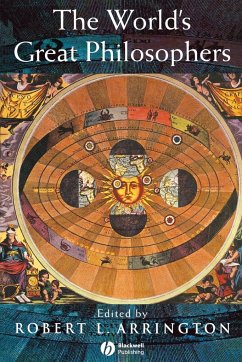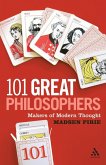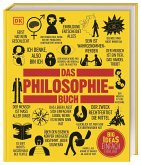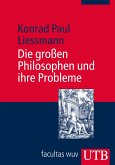The World s Great Philosophers provides an introduction to and overview of some of the most profound and influential thinkers in the history of philosophy.
Presents an introduction to and overview of some of the most profound and influential thinkers in the history of philosophy.
Contains 40 essays, written by an outstanding international assembly of scholars.
Provides cogent and accessible discussion of key philosophers from around the world.
Conveys the historical panorama of philosophical thought on the nature of reality, the human condition, and basic human values.
Hinweis: Dieser Artikel kann nur an eine deutsche Lieferadresse ausgeliefert werden.
Presents an introduction to and overview of some of the most profound and influential thinkers in the history of philosophy.
Contains 40 essays, written by an outstanding international assembly of scholars.
Provides cogent and accessible discussion of key philosophers from around the world.
Conveys the historical panorama of philosophical thought on the nature of reality, the human condition, and basic human values.
Hinweis: Dieser Artikel kann nur an eine deutsche Lieferadresse ausgeliefert werden.
"A wonderful collection of discussions written by major commentators on a diverse and wide-ranging set of philosophers. A superb sourcebook including helpful bibliographies." Michael Hodges, Vanderbilt University
"These expert and accessible essays range very widely, covering not only the familiar Anglo-American and Continental figures but thinkers from the Eastern tradition as well. Among the delights of the book are the many happy juxtapositions its alphabetical ordering presents. Thus the profound metaphysician Spinoza appears next to the profound anti-metaphysician Wittgenstein, and then one essay later we are given Zhuangzi - more familiarly, Chuang Tzu - a sage of an entirely different kind. Altogether a fascinating and enlightening collection." John V. Canfield, University of Toronto
"These expert and accessible essays range very widely, covering not only the familiar Anglo-American and Continental figures but thinkers from the Eastern tradition as well. Among the delights of the book are the many happy juxtapositions its alphabetical ordering presents. Thus the profound metaphysician Spinoza appears next to the profound anti-metaphysician Wittgenstein, and then one essay later we are given Zhuangzi - more familiarly, Chuang Tzu - a sage of an entirely different kind. Altogether a fascinating and enlightening collection." John V. Canfield, University of Toronto








